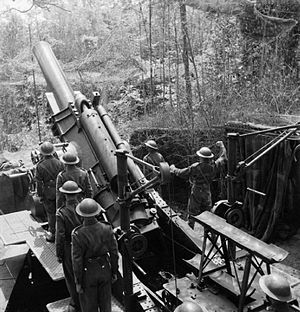BL 12-inch howitzer
| BL 12-inch howitzer | |
|---|---|
 12-inch howitzer Mk IV manned by Newfoundland troops training in the UK, 1942 | |
| Type | Heavy siege howitzer |
| Place of origin | United Kingdom |
| Service history | |
| In service | 1916 - 1945 |
| Used by | UK and Commonwealth |
| Wars | World War I, World War II |
| Production history | |
| Designer | Vickers |
| Manufacturer | Vickers |
| No. built | 14 (Mk II); 43 (Mk IV) |
| Variants | Mk II, Mk IV[note 1] |
| Specifications | |
| Barrel length | 160 inch (Mk II) 207.6 inch (Mk IV)[1] |
| Shell | HE 750 lb (340 kg) |
| Calibre | 12 inches (304.8 mm) |
| Recoil | Variable hydropneumatic |
| Carriage | siege carriage |
| Maximum firing range | 11,340 yd (10.37 km) (Mk II) 14,350 yd (13.12 km) (Mk IV)[1] |
The Ordnance BL 12-inch howitzer was a scaled-up version of the successful BL 9.2-inch siege howitzer.
History
Following the success of their BL 9.2-inch howitzer, Vickers designed an almost identical version scaled up to a calibre of 12 inches, the Mk II entering service on the Western Front in August 1916.[2] Eight complete equipments are reported as arriving in August 1916 and being in action in France shortly afterwards.
It was similar but unrelated to the BL 12 inch railway howitzers Mk I, III and V produced by the Elswick Ordnance Company at the same time.
The Mk IV was a more powerful version with longer barrel produced from 1917.
Later models were used for British home defence in World War II.
Service use

As with other large-calibre weapons, it was operated by the Royal Garrison Artillery in World War I.
The 12-inch was dismantled and transported in six loads mounted on traction engine wheels. It was then reassembled on its static siege mounting on top of a steel "holdfast", with 22 tons of earth in a box sitting on the front of the holdfast in front of the gun, to counteract the kick of firing.
Ammunition
-
Mk V HE shell, World War I
-
12 inch shell being loaded
See also
Weapons of comparable role, performance and era
- 305 mm howitzer M1915 Russian equivalent
- Skoda 305 mm Model 1911 Austro-Hungarian equivalent
Notes
- ^ Mk II = Mark 2, Mk IV = Mark 4. Britain used Roman numerals to denote Marks (i.e. models) of ordnance until after World War II. Hence this article describes the second and fourth models of British BL 12-inch howizers. Marks I, III and V were the models of the unrelated BL 12-inch railway howitzer.
References
Bibliography
- Dale Clarke, British Artillery 1914-1919. Heavy Artillery. Osprey Publishing, Oxford UK, 2005 ISBN 978-1-84176-788-8
- I.V. Hogg & L.F. Thurston, British Artillery Weapons & Ammunition 1914-1918. London: Ian Allan, 1972. ISBN 978-0-7110-0381-1


